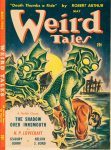 H P. Lovecraft (1890-1937) was the most significant writer of horror stories since Edgar Allen Poe. His stories began to appear in the horror magazine Weird Tales beginning in 1923. From exposure in Weird Tales, Lovecraft received literary success and developed a unique brand of cosmic horror.
H P. Lovecraft (1890-1937) was the most significant writer of horror stories since Edgar Allen Poe. His stories began to appear in the horror magazine Weird Tales beginning in 1923. From exposure in Weird Tales, Lovecraft received literary success and developed a unique brand of cosmic horror.
Although he died broke and unknown, Lovecraft’s legacy has spread widely in pop-culture. His complete stories and novels are in print, and some are even annotated. Having influenced writers as diverse as William S. Burroughs, Stephen King, and Neil Gaiman, many of his works have gained extended life in films such as Dagon, The Thing, and the Re-Animator series.
At the Mountains of Madness and the short stories collected as the Cthulu mythos are read by horror enthusiasts for their take on science, religion and the occult, madness, and xenophobia. The first paragraph of The Call of Cthulu distills his vision:
“The most merciful thing in the world, I think, is the inability of the human mind to correlate all its contents. We live on a placid island of ignorance in the midst of black seas of infinity, and it was not meant that we should voyage far. The sciences, each straining in its own direction, have hitherto harmed us little; but some day the piecing together of dissociated knowledge will open up such terrifying vistas of reality, and of our frightful position therein, that we shall either go mad from the revelation or flee from the deadly light into the peace and safety of a new dark age.”
Horror films tend to reflect cultural fears, politics and the repression of our time. Invasion of the Body Snatchers (1956) was a metaphor for the communist “Red Menace”, Night of the Living Dead (1968) was George Romero’s allegory on social justice and race relations. Its sequel Dawn of the Dead (1979) was a critique on hyper consumerism.
Lovecraft’s racism and belief in eugenics is well known and documented.”His bigotry and race-inflected narratives can’t be wished away, cherry-picked, or swept under the rug,” wrote Wes House, after the World Fantasy Award (a statue with his face on it) was awarded to author Nnedi Okorafor, (Akata Warrior, Akata Witch, and the Binti) series). Okorafor, was the first black person to win the World Fantasy Award since its inception in 1975, winning the award for her novel Who Fears Death (2011).
On her website blog, Okorafor, said, “Lovecraft is probably rolling in his grave. Or maybe, having become spirit, his mind has cleared of the poisons and now understands the err of his ways. Maybe he is pleased that a book set in and about Africa in the future has won an award crafted in his honor. Yeah, I’ll go with that image.” An enflamed internet discussion quickly arouse around Lovecraft’s toxic racism and in 2015, his face was removed as the World Fantasy Award and replaced.
 In the wild cult novel Lovecraft Country, author Matt Ruff, takes on both Jim Crow and Lovecraft — exposing one evil through another. Lovecraft wrote during the flourishing of Jim Crow laws and absorbed that poisonous atmosphere projecting into the cosmic evil of his “elder” monsters –an ancient race of evil beings. Ruff subverts the supernatural and Lovecraft’s racism, turning it into a quest for humanity and an occult-tinged road-trip for justice.
In the wild cult novel Lovecraft Country, author Matt Ruff, takes on both Jim Crow and Lovecraft — exposing one evil through another. Lovecraft wrote during the flourishing of Jim Crow laws and absorbed that poisonous atmosphere projecting into the cosmic evil of his “elder” monsters –an ancient race of evil beings. Ruff subverts the supernatural and Lovecraft’s racism, turning it into a quest for humanity and an occult-tinged road-trip for justice.
As a black version of X-files, Ruff thought Lovecraft Country would make an engaging television series featuring unknown worlds, police brutality and Sundown Town in the time of Jim Crow. In this 1950s American backdrop, the monsters of Jim Crow and Lovecraft are difficult to tell apart. Lovecraft Country is a breakthrough as a television series, dealing with white supremacy from an entirely black perspective. The dense visuals inside the novel are not surprising, since it was meant for the screen.
“Instead of white FBI agents,” said Ruff in an interview, “I came up with the idea for it to be about this black family that owned a travel agency in the 1950’s and published a guide for black travelers in the Jim Crow era… It’s a story of how this family is thrown into real life weird tales.”
Soon after the success of Lovecraft Country, facsimile editions of Jim Crow travel guides (known as “Green Guides”) began appearing over the next few years. An original “Green Guide” from 1958, sold recently at auction for $27,500.
An HBO series based on Lovecraft Country has recently aired to mixed reviews. Criticized for its “historical annotations” in the New Yorker, and praised for its engaging story and characters; “the production has a dreamy but vivid feel that hints at Lovecraft’s mesmeric quality while avoiding his florid excesses.” –from the New York Times.
The series stars an all-black cast and was written and produced by Misha Green (of the Underground series). “In horror, there’s a level of anxiety that your life can be taken at any moment,” Green said. “That’s the Black experience.” —interview, New York Times
The first episode can be viewed online here. Below is the official trailer for the series.
https://youtu.be/dvamPJp17Ds
